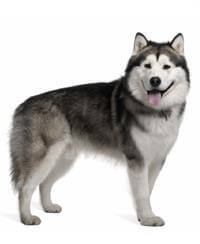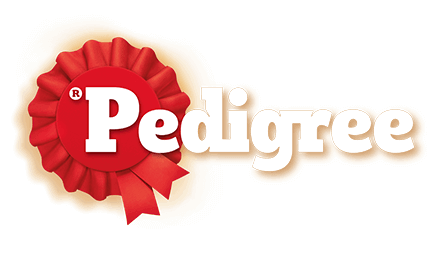Find products that match your dog’s needs

As Alaskan Malamutes originate from the Arctics, they are accustomed to thriving in freezing temperatures. These adorable wolf look-alikes are full of energy and can light up a room with their friendly nature and playful personality. For those who love to travel, go on escapades, or indulge in day-to-day physical activities, the Alaskan Malamute can make for a great furry partner. These dogs love exercising and putting their strong muscled bodies to use. Hence, if you are worried about adopting a pet due to your adventurous lifestyle, this dog breed fits right into your world.
You must consider Alaskan Malamutes’ height, weight, size, and more before adopting it. So, let’s take a look:
Weight | 34 to 38 kg |
Height | 23 to 25 inches |
Lifespan | 10 to 14 years |
Coat | Thick, double coat |
Alaskan Malamutes are large-sized, affectionate dogs that love snuggling with their humans. These beautiful beasts are known for their soft, yet thick coats. Here are some common coat colours of the Alaskan Malamute breed:
White
Grey & white
Black & white
Red & white
Seal & white
Silver & white
Sable & white
Blue & white
Agouti & white
Did you know? While red markings are common among Malamutes, the most unique and rare colour combination of the Alaskan Malamute breed is red and white.
If you want to make sure that you are bringing a purebred Alaskan Malamute home, look out for these physical characteristics:
Plumed tail curled over the back
Almond-shaped brown eyes
Erect ears
Medium sized muzzle
Thick neck scruff
A black-coloured snout
The Alaskan Malamute is often mistaken for a Siberian Husky. The best way to differentiate between a purebred Alaskan Malamute and a Siberian Husky is to notice the dog’s eyes. Alaskan Malamutes feature deep brown eyes while Siberian Huskies have blue eyes.
Alaskan Malamutes are one of the most friendly and affectionate dogs that you will ever meet in your lifetime. These fur babies love and crave human attention. That also goes to say that they get bored easily. The Alaskan Malamute personality is all about being the centre of attraction and rightfully so.
They don’t tend to choose favourites but love to snuggle equally with everyone. The average Alaskan Malamute size is around 35-42 inches long, making them the ideal snuggle partner. These dogs do not prefer barking much but are quite the chatters with their “woo woos”, yelps, howls, and more. Don’t be too surprised if they partake in a conversation!
Another amazing Alaskan Malamute behaviour trait is that they love babies. Don’t be surprised if you see this large-breed dog being goofy and playful with kids. However, it is advised to supervise your Malamute’s time with children because of its mighty build. They could easily knock a child over unintentionally.
While they are incredibly loyal and loving, there are some pointers of the Alaskan Malamute’s temperament that you must pay special attention to. They might not be very aggressive, but they are strong-willed and stubborn. As a breed that has a high prey drive and can be aggressive with other dogs, Alaskan Malamutes should not be let off their leash. It is best to start training them as soon as you can!
Training your Alaskan Malamute is extremely important and should not be delayed. These dogs are highly active and grow up to be quite large and stubborn. Hence, it is best to start training them early and make sure that they are accustomed to basic commands.
Alaskan Malamute dogs love digging, and it comes naturally to them. Training them is the best thing to do to keep your Malamute from digging up your yard.
Keeping in mind the average Alaskan Malamute size and height, it is okay to feel overwhelmed about training your furry companion. Here’s some good news: Alaskan Malamutes are easy to train. That’s right! The secret to successfully training your Alaskan Malamute dog is to involve several tasty treats, ensure brief training sessions, and shower it with lots of petting!
It is important to keep training sessions short for your Malamute because it can get distracted easily and run off. Start with basics like sit, stay, go, and more. Teach it how to walk with a leash on and reward it with tasty treats. Dog treats work like magic with Alaskan Malamute dogs because they will literally do anything for food.
Here’s how you can take care of your Alaskan Malamute:
Alaskan Malamutes are generally healthy and active, but they are prone to certain medical conditions. Heart defects and cancer are very common in the Alaskan Malamute breed. Hip dysplasia, cataract, progressive retinal atrophy, and inherited polyneuropathy are some other diseases that Alaskan Malamutes are prone to.
Grooming is extremely important for Alaskan Malamutes. Shedding season for these beasts is no joke. It is highly recommended to comb your Malamute’s fur once or twice a week during non-shedding seasons to ensure its coat is free of mats and knots. You can also use a high-powered pet grooming dryer. If you think of shaving your Malamute in order to keep it cool, please refrain from doing so as you could ruin its coat forever.
Its outer coat repels dirt and rain so rest assured that it does not need a bath very often. Bathing your Alaskan Malamute once every month or two is sufficient. Brush its teeth every alternate day and once a year, take it to a vet for professional cleaning. Lastly, trim its nails and keep your cuddle sessions stress free.
Have we mentioned that Alaskan Malamutes are extremely active? Their exercise needs are pretty high and need to be taken for multiple walks. A couple of hours of exercise includes brisk walks and slower walks so that they can explore their surroundings more. If you love jogging, you are about to become the happiest pet owner in the world. You can take your doggo with you for a jog every single day and strike off some of its exercise time. Other than that, you can play fetch with it or come up with your own fun games.
Since Alaskan Malamutes are sled dogs, you can have a lot of fun with them during the winter. Especially if it snows where you live, you can bring a sled and get adventurous because weight-pulling is one of their favourite activities.
There is no set portion or recommendation for your Alaskan Malamute’s food intake. The best person to guide you regarding its diet would be a vet. A vet will be able to advise the right portions according to your dog’s age, activity level, etc. An Alaskan Malamute’s weight can fluctuate easily because of its high metabolism. These dogs were bred to work hard on very little food; hence, they might not need as much food as other large-breed dogs do. Since they have a thick coat, their packing on any weight can be easily concealed. So, make sure you keep checking your dog’s ribs and waist.
Alaskan Malamutes, just like their cousins, Siberian Huskies, are one of the most ancient Arctic breeds on this planet. They were bred to be sled dogs, to pull heavy weights across long distances. Indigenous tribes such as The Malamutes and other people that migrated from Siberia to Alaska used Alaskan Malamutes for hauling heavy weights, hunting seals, and more. The American Kennel Club recognized this breed in the year 1935 and in the same year, The Alaskan Malamute Club of America was formed: to help breed these magical beasts.
Alaskan Malamutes may not be very friendly with other dogs of the same sex but introducing them to other dogs at an early age can help them learn. Some Alaskan Malamutes are sensitive to confrontation and for that reason, it is best to handle them gently.
Alaskan Malamutes make for great family dogs. They get along with children and love human attention!
It is best to not leave an Alaskan Malamute alone at home. They are very active, need mental stimulation, and love playtime. You might just come home to a mess created by your dog who wanted to play a little but had no one around.
Since Alaskan Malamutes have two layers of coat, it can be difficult to groom them. You can always take some professional help or learn your ways slowly!
Alaskan Malamutes are noisy and also qualify as chatterboxes, but surprisingly, they are not big on barking. They howl, woo, and “talk” back to you.

Find a PEDIGREE® stockist
near you!
Buy online
Click to buy from any of the retailers below

